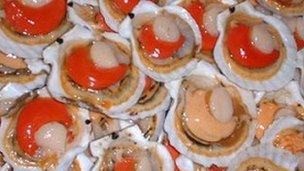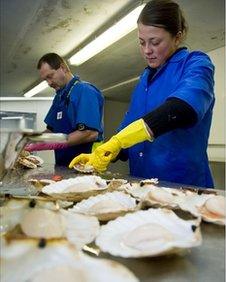Isle of Man queenies awarded European PDO stamp
- Published

Each year, the Isle of Man exports around £8m of scallops across the world
Isle of Man queenies have been awarded the European Union Protected Designation of Origin (PDO) stamp.
The type of scallop joins foods such as Gorgonzola and Champagne, which can only be labelled as such if they come from the designated region.
The meat from Manx Loaghtan lamb was awarded the stamp in 2008.
The legislation came into force in 1992 and the purpose of the law is to protect the reputation of regional foods and eliminate unfair competition.
'Years of hard work'
Fisheries minister Phil Gawne said: "The award comes after years of hard work and dedication by a great number of people. We have worked tirelessly to ensure the sustainability of our queenie industry and we are all delighted to get the stamp of approval.
"It is a unique product and one that the Isle of Man can be very proud of. It is revered around the world and now the PDO stamp will show everyone how important it is."
Each year, the Isle of Man exports around £8m worth of queenie scallops.
The industry currently supports around 150 jobs at sea and 200 on land.
Business development manager for Island Shellfish, Nick Pledger, said: "It's fantastic news.

The industry currently supports around 150 jobs at sea and 200 on land
'Feather in the cap'
"Everybody connected with the industry has worked extremely hard over the past decade to ensure that the fishery is well managed and sustainable.
"PDO is another feather in the cap for the Isle of Man, it not only protects their name but it also reinforces the fact that the best Queen Scallops in the world are those caught in Manx waters."
Mr Pledger said he supplies Manx queenies to a number of top restaurants in the UK, including Jamie Oliver's restaurants and Rick Stein's seafood restaurant.
According to government figures, 96% of the island's scallops are exported, largely to France, Spain and Italy.
Over the last decade, Manx fisherman have worked alongside the government to balance commercial needs and the need to protect the marine environment.
Fisherman now use light mesh trawls instead of dredging the sea bed, while juvenile queenies are thrown back into the sea and protected.
- Published27 January 2011
- Published19 April 2012